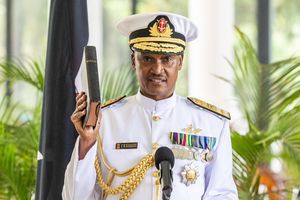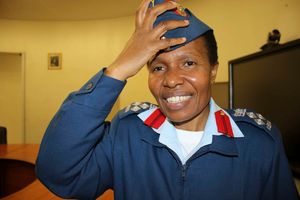
Combined Joint Task Force-Horn of Africa Commanding General Maj-Gen Jamelle Shawley with then-National Defence College Senior Directing Staff- Air Force Maj-Gen Fatuma Ahmed during a dialogue on US-Kenya security partnership at the University of Nairobi on February 14, 2024
The appointment of Maj-Gen Fatuma Gaiti Ahmed as service commander in Kenya – and probably Africa – is a gendered story of determination and resilience intertwined with the progress made by women in the military.
From entering the military when women were not allowed to marry or have children to clawing her way to the coveted service commander position, Maj-Gen Ahmed’s rise is a milestone.
In the early days of the Kenya Defence Forces (KDF), a camp was specifically built for the seven Women Service Corps members at Eastleigh Air Base Officers Mess while the rest of the officers went to the barracks.
Among them were Maj P.N. Ikua, Judy Angaine and later Maj-Gen Ikua.
Were it not for Gen Daudi Tonje’s foresight, Maj-Gen Ahmed and her Women Service Corps colleagues would perhaps still be serving as the despised female auxiliary team confined to stores or clerical jobs.
Her journey to the helm of the Kenya Air Force began in 1983 when she was recruited as a cadet after jokingly lining up at a stadium in her home town to join the army even though she was serving as a prisons officer.
She had returned home in search of a national identity card but was instead recruited into the military in 1984.
She graduated as Second Lieutenant to serve in the Women Service Corps – an auxiliary unit of the military that was dedicated to churning out women who only served in secretarial and store management roles.
Members of the corps were not even considered fit enough to be their own drivers, let alone soldiers.
Thanks to the push by the Defence Council chaired by Cabinet secretary Aden Duale, Maj-Gen Ahmed was named the head of Kenya Air Force.
Mr Duale, who has cultivated close relations with Defence Council, has pushed for firsts in the KDF.
It is during his stint as Defence Cabinet Secretary that women have been named to senior positions.
Despite being senior officers, members of the Women Service Corps were looked down upon by male soldiers.
About 10 years after her predecessors began their quest to be formally integrated into the mainstream Kenya Army, Kenya Air Force and Kenya Navy, Maj-Gen Fatuma Ahmed joined the Air Force after the disbandment of the Women Service Corps in 1999.
The assimilation of the corps into the mainstream military also did away with restrictions imposed on women not to marry or get pregnant.
Maj-Gen Ahmed, who is married to a fellow military officer, has three children.
She served as a battalion commander and later headed the Personnel Department at the Air Force before being promoted to Brigadier.
She became the Managing Director of the Defence Forces Medical Insurance Scheme on August 10, 2015.
She was the first woman brigadier, first female major general and now the first female service-commander. Maj-Gen Fatuma may even become the first female Chief of Defence Forces.
Also Read: Against all odds: The unlikely rise of General Francis Ogolla to the helm of Ruto’s military
Several women officers occupy enviable ranks and positions in the Kenyan military.
Brig Zipporah Kioko is Chief of Strategic Communications at Defence Headquarters, Brig Yvonne Kerubo is the Chief of Legal Service at Defence Headquarters, Brig Joyce Sitienei is the Director of the International Peace Support Training Centre, Karen, Brig Elizabeth Omollo is the Director of Examinations at the National Defence University-Kenya while Brig Caroline Mutisya is attached to the Office of the National Security Adviser to the President.
The fight by women to be assimilated into the mainstream military has not been easy, if recollections by many like Maj (rtd) P.N Ikua, are to go by.
The retired major says it was years after writing a proposal on how women could be integrated into the military that then-Chief of General Staff Daudi Tonje actualised it.
“In 1975 I wrote a paper proposing the assimilation of women into the three services so that they would come directly under their unit command system for career development as opposed to being restricted to a limited career path in the Women’s Service Corps,” she says in a book on Kenya Army.
“The idea was to create an avenue to develop, get promoted and generally grow alongside men within the services. Promotion is only possible in a system where there is a career progression path, hence the fight for assimilation of women into the services.”
Maj (rtd) Ikua says women were initially never accepted as equal soldiers, drivers or riflemen. There always was a distinction of the men and the women in the forces.
Her quest to integrate women into the services and train them into tough soldiers who could work and compete alongside men was met with opposition.
Twenty four years after her proposal, Gen Tonje took it up.
“I was very happy that it was finally happening as had happened in other countries. That women were going to be part of the Army, Air Force and the Navy was the happiest day of my life,” she recalls.
Though she had earned a degree in Psychology, she and her six female colleagues in the Women Service Corps were not considered good enough to be in the mainstream military.
Her induction into the army was not as easy as she had thought it would be, what with the hatred she faced after being driven to the Armed Forces Training College (AFTC), an abomination for a cadet recruit.
She joined six other females who had started their training four months earlier, much to the chagrin of staff officers who resolved to make her life difficult because she was a graduate.
For Maj (rtd) Ikua and her deputy and close friend Judy Angaine, the initial days were rough.
“If the first lot of women had not fought it out, many others after them would have left because it was not easy,” the retired KDF major recalls in the military publication.
“We were going into a hostile environment where we were not accepted. We were repeatedly called wanawake (women)and the male soldiers would not salute us even after we became officers. In the Mess, we were the only ones left with the trainees.”
After commissioning, she and her female colleagues were posted to Eastleigh Air Base in Nairobi where a camp was specifically put up for them.
Female officers were accommodated at the Officers Mess while the rest went to the barracks.
She admits that it was challenging to convince Army Headquarters-based officers but it was not impossible though there was resistance.
“We had no identity. That is what we kept fighting for in order to be recognised as part of the Armed Forces and not as just a small unit that is called upon to support the male officers and service members,” she says.
The women sought to have a career development and recognition in the service just like their male colleagues.
“The happiest day of my life was when I got the information that finally women were going to be part of the Army, Air Force and the Navy. I think the women in the military have met my expectations but honestly I am still not fully satisfied with the actual integration,” the retired major says.
“There are still some careers in the military that women have not got into without limiting themselves. It is good that the training is the same for men and women but I won’t rest until there are female generals.”
Women, she says, need to be dedicated and work hard enough to earn respect and recognition.







